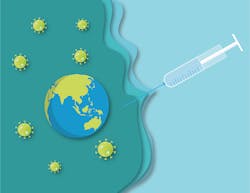U.S. government engages Pfizer to produce millions of COVID-19 vaccine doses
The U.S. Department of Health and Human Services (HHS) and the Department of Defense (DoD) have entered into an agreement with U.S.-based Pfizer for large-scale production and nationwide delivery of 100 million doses of a COVID-19 vaccine in the United States following the vaccine’s successful manufacture and approval. The agreement, worth $1.95 billion, also allows the U.S. government to acquire an additional 500 million doses, according to a press release from HHS.
The federal government will own the 100 million doses of vaccine initially produced as a result of this agreement, and Pfizer will deliver the doses in the United States if the product receives Emergency Use Authorization (EUA) or licensure from the U.S. Food and Drug Administration (FDA), as outlined in FDA guidance, after completing demonstration of safety and efficacy in a large Phase 3 clinical trial.
By entering into this agreement now, a safe and effective vaccine can be shipped quickly if FDA grants EUA or licensure. This approach helps meet the U.S. government’s Operation Warp Speed goal to begin delivering 300 million of doses of safe and effective vaccine to the American people by the end of the year.
The Biomedical Advanced Research and Development Authority (BARDA), part of the HHS Office of the Assistant Secretary for Preparedness and Response, collaborated with the DoD Joint Program Executive Office for Chemical, Biological, Radiological and Nuclear Defense and Army Contracting Command, to provide $1.95 billion for the production and nationwide delivery of the first 100 million doses of the vaccine after EUA or licensure, with the ability to acquire up to an additional 500 million doses.
Subject to technical success and EUA or licensure, the company would begin nationwide delivery of these vaccine doses to locations at the U.S. government’s direction beginning in the fourth quarter of 2020. The vaccine would be available to the American people at no cost. As is customary with government-purchased vaccines, healthcare professionals could charge insurers for the cost of administering the vaccine.

